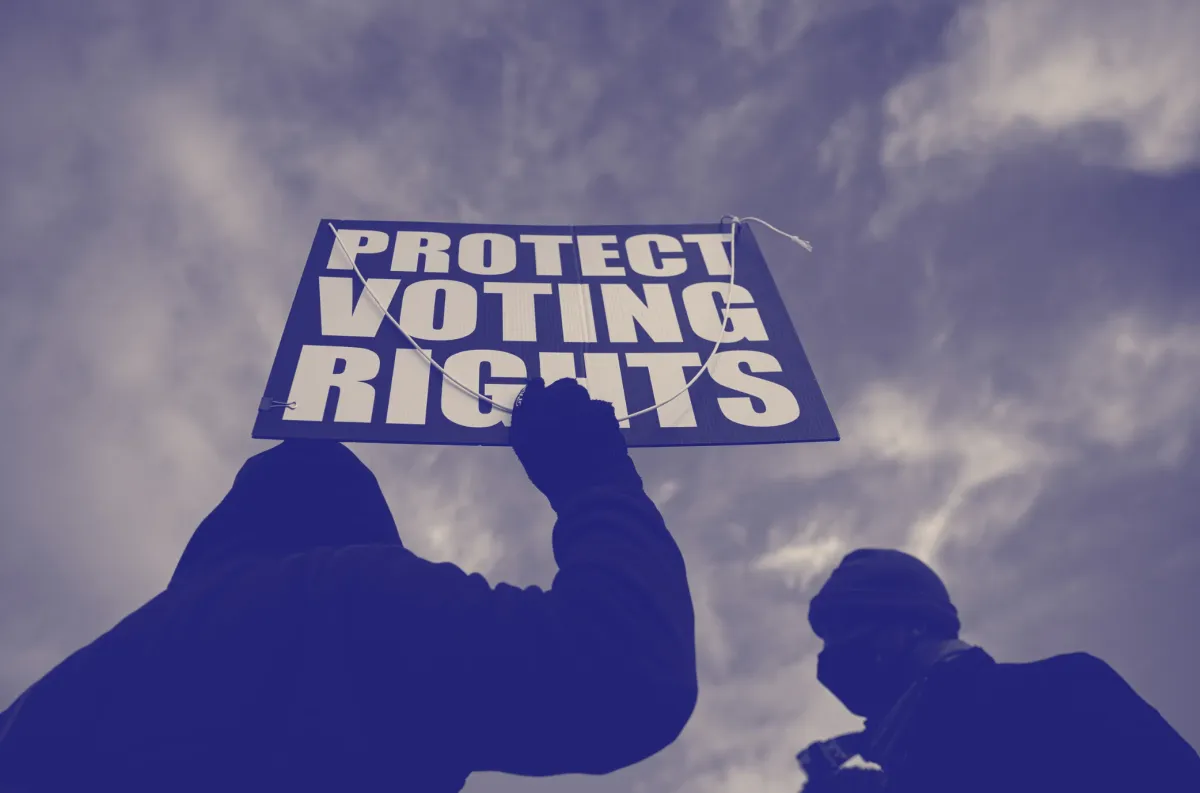Protecting Democracy & Voting Rights

Why Support Protecting Democracy & Voting Rights?
1. Combats Voter Suppression: It's Still Happening
Recent laws in various states have introduced strict ID requirements, reduced early voting, or limited mail-in ballots—these measures disproportionately affect people of color, the elderly, rural voters, women and low-income communities. That’s not democracy—it’s discrimination.
2. Preserves Equal Representation: Every Vote Deserves Equal Weight
When politicians rig the system through gerrymandering, they choose their voters instead of the other way around. Protecting voting rights means fighting for fair maps and equal representation—no matter your zip code.
3. Prevents Authoritarian Backsliding: Democracy Is Fragile
Democracy is being tested globally and at home. Protecting voting rights is a frontline defense against creeping authoritarianism and efforts to undermine democratic institutions. We’ve seen what happens when people stop trusting elections. The events of January 6 were a wake-up call: democracy only survives if we protect it. That starts with safeguarding the right to vote.
4. Secures Against Election Misinformation: The Truth Must Win Over Lies
The spread of false claims about election fraud has led to distrust and even violence. Widespread misinformation about "stolen elections" has deeply eroded public confidence. By reinforcing voting rights and transparency, we combat conspiracy with truth, trust, and civic integrity.
5. Protects Vulnerable Populations: Accessibility Is a Right, Not a Perk
For people with disabilities, older Americans, or those in remote areas, options like mail-in voting are essential—not optional. Voting access should be expanded, not restricted.
6. Upholds the Constitution: It Demands It
Voting is a fundamental right enshrined in the Constitution. Any erosion of that right undermines the legal foundation of the United States. Every time we restrict access, we violate the very principles this country was built on.
7. Strengthens National Unity: A Strong Democracy Brings Us Together
When everyone participates, election results reflect the true voice of the people. That builds unity—even when we disagree. Protecting the vote is how we protect each other.
8. Increases Government Accountability: Accountability Only Works If We Can Vote
When more people vote, elected officials are more likely to be held accountable to a wider range of constituents. If leaders know only a fraction of people can vote, they only answer to a fraction. But when all voices are heard, politicians must govern for everyone—not just the loudest or wealthiest.
9. The Best Defense Against Disinformation is Civic Engagement
Active and fair democratic participation reduces the impact of disinformation by encouraging informed voting and greater media literacy. The antidote to propaganda is participation. A well-informed, active electorate is our strongest weapon against lies and manipulation.
10. Protects U.S. Global Standing: The World Is Watching
America’s moral leadership on democracy and human rights is weakened if its own elections are unfair or discriminatory. America cannot lead on democracy abroad if we don’t practice it at home. When we weaken voting rights, we send the message that democracy is only for some—not all. We must do better.
11. Safeguards for Young Generations: Youth Deserve a Say in Their Future
Young voters are often the most affected by restrictive laws (e.g., limits on campus voting or ID laws). Protecting voting access ensures their voice shapes the future. We owe it to them to protect their voice, not silence it.
12. Ensures Peaceful Transfer of Power: It’s How We Keep the Peace
A trusted electoral process reduces the risk of political violence and unrest. Strong voting rights protections are essential for the peaceful continuation of democratic governance. The peaceful transfer of power—a hallmark of American democracy—depends on trust in the vote. That trust begins with ensuring every vote is counted and every voter is valued.
Let us Call Congress For You!
Making phone calls can be a hassle, having to take time out of your day, hoping the phone lines are open, and dealing with whomever answers the phone. Not anymore! our AI Agents will call congress on your behalf and advocate for you! Only $5 for three calls covering your states two senators and your representative in the US House of Representatives. After the call, recordings of the calls will be emailed to you! (Where permitted)
